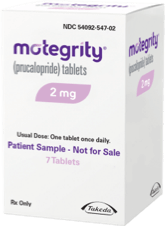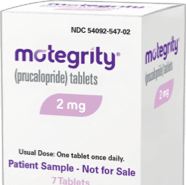
By following this link you will be leaving a Takeda controlled website for a third party website
Please note that Takeda is not responsible or liable for any third party website and the website may not be appropriate for all audiences.
For adults with Chronic Idiopathic Constipation (CIC)
The safety and tolerability profile of Motegrity was studied in 2530 patients (Motegrity 2 mg once-daily [N=1251], placebo [N=1279]) with CIC across 6 double-blind, placebo-controlled clinical trials of 12 to 24 weeks duration. Overall, most patients were female (76%) and Caucasian (76%), with a mean age of 47 years (range 17 to 95).1
Suicidal Ideation and Behavior: In clinical trials, suicides, suicide attempts and suicidal ideation have been reported. Postmarketing cases of suicidal ideation and behavior as well as self-injurious ideation and new onset or worsening of depression have been reported within the first few weeks of starting Motegrity. A causal association between treatment with Motegrity and an increased risk of suicidal ideation and behavior has not been established. Monitor patients for new onset or worsening of depression and emergence of suicidal thoughts and behavior. Instruct patients to discontinue Motegrity immediately and contact their healthcare provider if they experience any of these symptoms.1
No overall differences in safety and effectiveness were observed between elderly and younger patients. Adjust the dosage in elderly patients based on renal function. Avoid Motegrity in patients with end-stage renal disease requiring dialysis.1
Results from double-blind, placebo-controlled trials of Chronic Idiopathic Constipation (CIC) of at least 12 weeks duration
| Adverse Reaction |
Motegrity 2 mg once daily (N=1251†) |
placebo (N=1279) |
| Headache | 19% | 9% |
| Abdominal Pain‡ | 16% | 11% |
| Nausea | 14% | 7% |
| Diarrhea | 13% | 5% |
| Abdominal Distension | 5% | 4% |
| Dizziness | 4% | 2% |
| Vomiting | 3% | 2% |
| Flatulence | 3% | 2% |
| Fatigue | 2% | 1% |
*Reported in ≥2% of patients receiving Motegrity and a rate higher than patients receiving placebo.
†Includes 93 patients who started on Motegrity 1 mg and increased to Motegrity 2 mg.
‡Includes abdominal pain, upper abdominal pain, lower abdominal pain, abdominal tenderness, abdominal discomfort, and epigastric discomfort.
Less common adverse reactions reported in <2% of patients receiving Motegrity 2 mg once daily included: abnormal GI sounds, decreased appetite, migraine and pollakiuria.
If reported within the first week of treatment, adverse events of diarrhea or headache typically resolved within a few days.1
The majority of patients who reported diarrhea did so in the first week of treatment (n=110/157), and the majority who reported headache did so in the first two days of treatment (n=157/237). For these patients, symptoms typically resolved within a few days (n=80/110 for diarrhea; n=102/157 for headache).1
Severe diarrhea was reported in 1.8% of patients treated with Motegrity 2 mg compared to 1% of patients in the placebo group, and had a similar onset and duration as diarrhea overall.1
Overall, discontinuation due to adverse events was low (5% Motegrity 2 mg once daily, 3% placebo).1
Interested in receiving samples of Motegrity?
Your patients can benefit from a trial. Order a 7-day sample to get started.


Cardiovascular safety of Motegrity was evaluated in a MACE analysis of the double-blind, placebo-controlled and open-label studies, as well as in a retrospective observational study which demonstrated no increase in the risk of MACE with Motegrity relative to polyethylene glycol (PEG).1
MACE=Major Adverse Cardiovascular Events, which were defined as: cardiovascular death, nonfatal myocardial infarction, and nonfatal stroke.1
§2X max recommended dose of 2 mg. PEG=polyethylene glycol 3350
Wondering which plans in your area cover Motegrity? See our patient access coverage tool to find out more.
Patient access coverage toolPlease expand for Indication and Important Safety Information.
Contraindications
Warnings and Precautions
Suicidal Ideation and Behavior: In clinical trials, suicides, suicide attempts and suicidal ideation have been reported. Postmarketing cases of suicidal ideation and behavior as well as self-injurious ideation and new onset or worsening of depression have been reported within the first few weeks of starting Motegrity. A causal association between treatment with Motegrity and an increased risk of suicidal ideation and behavior has not been established. Monitor patients for new onset or worsening of depression and emergence of suicidal thoughts and behavior. Instruct patients to discontinue Motegrity immediately and contact their healthcare provider if they experience any of these symptoms.
Adverse Reactions
Most common adverse reactions (≥2%) are headache, abdominal pain, nausea, diarrhea, abdominal distension, dizziness, vomiting, flatulence, and fatigue.
Use in Specific Populations
INDICATION
Motegrity® (prucalopride) is a serotonin-4 (5-HT4) receptor agonist indicated for the treatment of chronic idiopathic constipation (CIC) in adults.
Please click here for full Prescribing Information.
1. Motegrity (prucalopride) Prescribing Information. Lexington, MA: Takeda Pharmaceuticals America, Inc.
